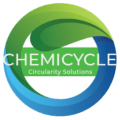In 2010, the world produced 275 million tonnes of plastic. By 2030 that number is set to double.
— Mike Hudema (@MikeHudema) May 22, 2024
We have the solutions. It's time to end plastic pollution.#ActOnClimate #oceans #useless #buyless #wasteless pic.twitter.com/PVebMyfuJI
The Big Clean up
Every plastic-polluted coastline, river, street and landfill is an opportunity to clean up and convert this fossil fuel-derived material into either something else or restore it to be reused again. Repolymerisation is exactly that process and can not only reduce the CO2 emitted it can reduce the amount of Crude Oil used or needed, the VOCs emitted and the chance to clean up the mess humans make of our pristine planet.
Repolymerisation is the process of recombining monomers or oligomers into polymers after they have been depolymerised. Essentially, it involves the reformation of polymer chains from smaller molecular units that were previously broken down.
This process can be particularly useful in recycling plastics, as it allows for the recovery and reuse of polymer materials by breaking them down and then reconstructing them into new, usable polymers.
Repolymerisation or if you're in Europe Repolymerisation can occur through various mechanisms, including:
This process can be particularly useful in recycling plastics, as it allows for the recovery and reuse of polymer materials by breaking them down and then reconstructing them into new, usable polymers.
Repolymerisation or if you're in Europe Repolymerisation can occur through various mechanisms, including:
1. **Addition Polymerisation**: Involves the recombination of monomers with double bonds (e.g., ethylene) where the monomers add to each other without the loss of any small molecules.
2. **Condensation Polymerisation**: Involves the recombination of monomers with the elimination of small molecules such as water or methanol, common in the synthesis of polyesters and polyamides.
In an industrial context, repolymerisation is a crucial step in the circular economy for plastics, enabling the conversion of waste plastics back into valuable materials.
This process not only helps in reducing waste but also conserves resources by reducing the need for virgin polymer production.
Talk to us today about how we can help you reprocess and increase your resue of recylced feedstock.
2. **Condensation Polymerisation**: Involves the recombination of monomers with the elimination of small molecules such as water or methanol, common in the synthesis of polyesters and polyamides.
In an industrial context, repolymerisation is a crucial step in the circular economy for plastics, enabling the conversion of waste plastics back into valuable materials.
This process not only helps in reducing waste but also conserves resources by reducing the need for virgin polymer production.
Talk to us today about how we can help you reprocess and increase your resue of recylced feedstock.
